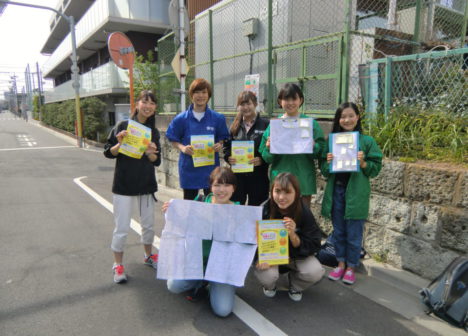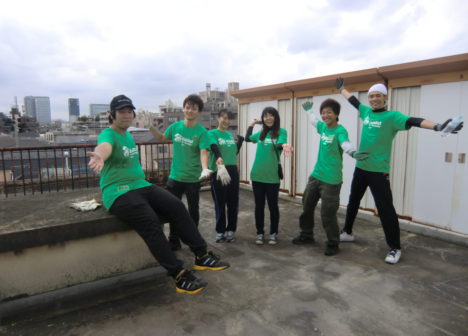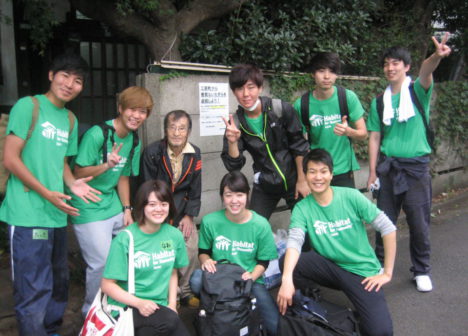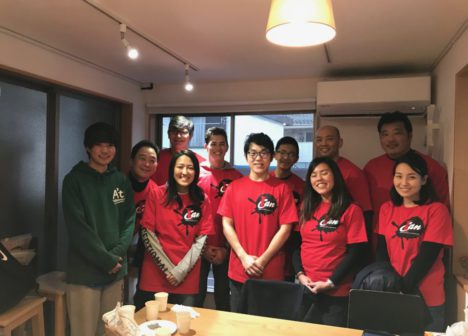Written by Hanae Inagaki
TOKYO (December 2017) - Project HomeWorks is Habitat Japan’s domestic project focused on providing housing support to the vulnerable in Tokyo. It launched 8 months ago in April. Seasons quickly passed us by and now we are heading to the end of the year.
We’ve met many people since the launch. Some had to sleep on the street, some got out of homelessness making the first step toward their new life, some were on the verge of being homeless while some others devoted their free time generously to support people in need. We witnessed how people live supporting each other. New year is approaching, and our thoughts go to them, wondering how each of them is moving into a new year and how they are feeling.
As a wrap up of the year of 2017, here we summarize what we have achieved in the past eight months exploring the ways to provide support in cooperation with various partners.
< Launching and developing the project>
Project HomeWorks was launched for two objectives; 1) To support people who suffer from deteriorated housing environment for various reasons by helping them to maintain their houses and 2) to support people who are struggling in securing a decent place to live by helping them find new house. For the first objective, we provide cleaning, tidying and minor repair support in cooperation with many volunteers to improve their living environment.
We engage ourselves in providing long-term support rather than one-off basis support; we regularly meet the people we are connected to. We visit their houses and may ask how they are doing or simply enjoy chatting. If they had any needs for help, we stand shoulder to shoulder with them to figure out solution or to connect them to local administration or other support groups.
We met 17 people including those who only needed counselling support between April and December 16th 2017. House cleaning and maintenance support was provided to 15 people and facility maintenance support was provided to two homeless shelters.
<Number of people we supported>
15 individuals in total (13 males and 2 females)
Number of people we supported by age group
|
20s |
30s |
40s |
50s |
60s |
70s |
80s |
|
0 |
2 |
0 |
5 |
2 |
2 |
4 |
Number of people with disability
|
Physical disability |
Mental/developmental disorder (including potential disorder) |
|
2 |
8 |
Their housing type
|
Rent |
Own |
|
14 |
1 |
State of household
|
Living on welfare |
Living alone |
|
12 |
15 |
Habitat for Humanity’s mission is to help securing decent home. Our international efforts include construction and maintenance of houses, providing support for securing land tenure and building sanitary facilities (e.g. toilets and wells) which are essential for housing.
For domestic efforts, we decided to focus on improvement of living environment rather than building houses as we launch our activity in Tokyo. The reasons behind this decision were that building new houses was not an effective way of providing support due to increasing number of vacant houses across Japan and that the construction cost is far higher in Japan than developing countries.
Construction of house and improvement of living environment are both tangible support, addressing issues around housing. Project HomeWorks goes beyond such tangible support and provide intangible support that involves continuous life support. There is a specific reason behind this; many people who face living environment deterioration feel uncomfortableness or loneliness for some reason.
Mr. Okumura, aged 89, who lives in Nakano ward contacted us following his home caregiver’s advice. (*Note: The name is fictitious.)
His apartment was neat and clean, but he needed help wiping off the dust on top of a chest of drawers. He was unable to do so as he suffered backache and frailty.
After we cleaned the chest with a duster and a vacuum cleaner, he shared with us his life’s story; he used to run a Japanese style restaurant. His wife has already passed away. He merely sees his children because they live far away or are too busy. We saw a little bit of loneliness in his smile but at the same time, he seemed to be relieved to be connected with us who he can ask for help for minor troubles.
We want to help elderly people like Mr. Okumura and people with disability so that they can continue their life in their own community. That's why we provide both tangible and intangible support through Project HomeWorks.
<Significance of volunteer involvement >
Volunteers provide significant support for Habitat for Humanity. Tangible support by Project HomeWorks, which include cleaning and tidying, is mainly provided by volunteers. Thanks to the solid network of volunteers who support us, 113 volunteers in total joined us in the last six months.
However, we sometimes get questions and comments such as “why volunteers are involved in your activity? can they not ask their family or neighbors for help?” “they can ask vendors to help they if they can afford it,” and “there should be some administrative service they can use.” These comments do make sense. However, not everyone can reach out to someone close to them when they are in desperate need for help, suffering from deteriorated living environment. One could be estranged from his family or neighbors. Another could be reluctant to ask for help to someone he knows even if he is in touch with his family or neighbors. We believe that in many cases it is easier for people to get support from someone they don’t know personally.
Almost none of the 15 people we have supported so far had financial leeway. In addition, our activity has revealed that many of people in need for support are not sure who to reach out to on troubles they face at home.
One of the people we met said that he decided to seek support from Habitat when his caseworker told him about our volunteer support. In fact, 13 out of the 15 people were referred to us by various supporters who had already been helping them. However, they are the lucky ones who already had specialists who they can consult. We believe that there are still many people who are distressed by housing issues but haven’t expressed their need for help. Finding out a way to reach to such people is a challenge we are eager to take on.
<The impact of volunteers>
We would like to introduce some of the stories that tell how volunteers impacted the lives of elderly people or people with disability. All names are fictitious.
<Mr. Suzuki, in his 80s>
Mr. Suzuki lives alone in a house he has been living since his childhood. He has been taking care of the house after his parents’ deaths and keeps many treasured mementos. As he became physically weaker, however, it became hard for him to tidy up the house on his own. Our volunteers have been visiting him regularly since last April. When our student volunteers visit him, he willingly talks to them. He may be reminded of the time that we was teaching at a university. These interactions help him to spend more time on physical activity than usual as he joins volunteers to do as much as he could, such as put trashes together for disposal.
<Mr. Ota, in his 30s>
Mr. Ota moved to his current apartment where he lives alone after spending some time at a homeless shelter. Organizing and cleaning the room are challenges for him. His room was unhygienic as daily necessities and clothes were scattered on the floor and rotting foods were kept in the kitchen. Our volunteers visited him twice in 6 months for cleaning. He sorted out his belongings identifying necessary and unnecessary things by himself as the volunteers helped cleaning his room. He repeatedly said that he wants to be able to organize his room by himself and wants us to help him figure out how to store things.
In many cases, having young volunteers visit home gives positive stimulus to people we support, especially elderly people like Mr. Suzuki. We believe that we can also contribute to solving senior isolation issues, which is a concern for apartment owners and neighbors - if we could stay in touch with the people we met through cleaning support by volunteers.
Most importantly, our volunteer support can restore a healthy living environment especially for those who have difficulty in organizing and cleaning. It provides the first step toward turning a mare place with a roof and four walls into real home. Living in hygienic, organized room may also help recovering their dignity. It may also motivate people like Mr. Ota to be able to organize the house on their own.
However, it would take a long time to make organizing a habit for people who find organizing difficult due to developmental disorder or other similar reasons. Forcing them to make organizing a habit could cause additional stress resulting in a negative effect if they are not willing to change themselves in the first place. We have seen several cases where living environment of people with difficulty in organizing deteriorated again after cleaning support by volunteers. But, how they could find a place to live if they had to be isolated from the community just because they can’t stay organized?
Our view is that people can ask us for help again and again, anytime they are in trouble with piles of things and trashes at home. It requires a trustful relationship which can encourage people to send us an SOS repeatedly. We also would like to support people who wish to be able to stay organized by a step-by-step approach to enable them to organize their room. Our solid network of volunteers is making all these efforts possible so that we can carry on Project HomeWorks.
<Supporting search for new home>
The government put new Housing Safety Net Law in force this year. It includes new housing initiatives such as establishing a registration system for rental housing which are open to people who need special care in securing housing, such as seniors, low-income individuals, families with children, people with disability and people who are impacted by natural disasters.
In the past 6 months of implementing the project, we have witnessed how rental housing choices are limited for homeless people who live on welfare or who are aged. An elderly person who we helped cleaning the house was living on welfare. His apartment was dilapidated allowing mice to come into his room and windows were covered with plywood. However, if the owner of the apartment decides to demolish and rebuild, a concern for finding a new place for him to live will arise for sure. Project HomeWorks will strengthen our support in searching new home for people who have to leave current house for certain reasons like restoration of their apartment as well as for people who are trying to get out of homelessness. We will make our efforts to build wider awareness of the housing issue and reinforce our partnership with various stakeholders including local governments, real estate agents and owners of rental property.
<Summary>
We have already mentioned that volunteers possess great significance for Project HomeWorks. Unlike professional cleaning vendors, volunteers may not necessarily be able to provide support in timely manner and the quality of the service may be lower. We feel, however, even such inconvenience has a positive side, creating equal relationship between those who support and those who are supported, which results in effective communication.
Habitat for Humanity in Japan will continue to support people who are facing housing issues. We want to be like a pacemaker for marathon runners and be able to offer an assistance just like offering a bottle of water to a runner who failed to get water at water station by himself. This may look an officious act in a way but we would be happy if we could continue working together with a lot of volunteers.
Majority of the 15 people we have supported so far had experiences of living on the streets or homelessness. We could reach out to such people thanks to the support provided by many organizations that help homeless including Tsukuroi Tokyo Fund. We would like to take this opportunity to thank all of our partner organizations.
We also would like to express our sincere appreciation to the student members of campus chapters, volunteers from companies and organizations and contributors who support the mission and activity of Project HomeWorks.
Habitat for Humanity Japan will continue to make our efforts to turn “a place to sleep with a roof” into “home,” a safe and relaxing place to take a rest. We hope to ease anxiety and loneliness of people who have no network to fall back on by helping them deal with living environment issues and keeping in touch with them so that they can continue living in their own community with ease.




We would like to extend our appreciation for all the volunteers who joined our activity. We appreciate your continued support and greater involvement.
Translated by Yoko Samura
